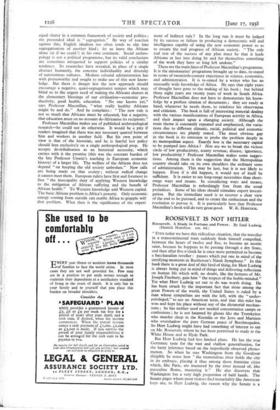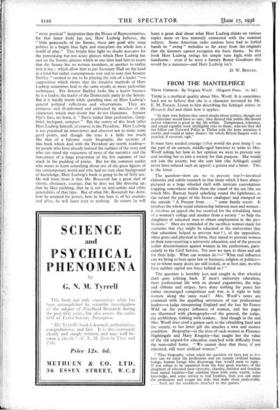ROOSEVELT IS NOT HITLER
Roosevelt. A Study in Fortune and Power. By Emil Ludwig. (Hamish Hamilton. zos. 6d.)
" EVEN today we have this ridiculous situation, that the traveller in a transcontinental train suddenly finds himself compelled, between the hours of twelve and five, to become an ascetic saint, because he happens to be passing through a dry State, and then after five o'clock he is once more permitted to become a bacchanalian reveller : pauses which put one in mind of the terrifying.momenrs in Beethoven's Ninth Symphony." In this book there is a great deal of this kind of thing, for Herr Ludwig is always being put in mind of things and delivering reflections on human life which will, no doubt, like the lectures of Mr. Joseph Finsbury, gain•him " the respect of the feeble-minded." Yet what Herr Ludwig set out to do was worth doing. He has been struck by the important fact that alone among the great Powers of the world, the United States is ruled by a man whose sympathies are with the left, with the " under- privileged," to use an American term, and that this ruler has won and kept his place without any of the dictatorial mechan- isms ; he has neither used nor needed concentration camps or confessions ; he is not haunted by ghosts like the Trotskyites who murder sleep in the Kremlin or the Jews and Marxists who overshadow the pure German peace of Berchtesgaden. So Herr Ludwig might. have had something of interest to say on Mr. Roosevelt, whom he has been permitted to study at the White House and at Hyde Park.
But Herr Ludwig had less limited plans. He has the true Germanic taste for the vast and shallow generalisation, for the hasty inference based on the imperfectly observed pheno- menon. So when he sees Washington from the Goodyear dirigible he notes how " the tremendous river holds the city in its embrace, placing it thus among those feminine cities which, like Paris, aie mastered by the river instead of, like masculine Rome, mastering it." He also discovers that Washington has a very high proportion of bald heads. The Senate pages whom most visitors find remarkably like American boys are, to Herr Ludwig, the reason why the Senate is a " more poetical " institution than the House of Representatives, for that latter body has not, Herr Ludwig believes, the " little gamecocks of the Senate, these airy genii who steep politics in a bright blue light and transplant the whole into a world of play." This bright blue light no doubt accounts for the patronising but not acute glances which Herr Ludwig has cast on the Senate, glances which at one time lead him to assert that the Senate has no women members, at another to realise that it has ; which allow him to pat Secretary Hull on the head in a kind but rather contemptuous way and to note that Senator Barkley " seemed to me to be playing the role of a leader "—a supposition which shows that the intuitive methods of Herr Ludwig sometimes lead to the same results as more pedestrian techniques. For Senator Barkley looks like a leader because he is a leader, the leader of the Democratic party in the Senate. But it is hardly worth while spending time on Herr Ludwig's general political reflections and observations. They are pompous and ill-informed and enlivened by sketches of the . characters which may dazzle but do not illuminate. Senator Nye's face, we learn, is " Slavic rather than proletarian, sharp, . brief, inelegant, compact." But the centre of this book (after Herr Ludwig himself, of course) is the President. Herr Ludwig is too practised an interviewer and observer not to make some good points, and though the tone is a little too much like that of a fulsome royal biography, the sections of this book which deal with the President are worth reading— by people who have already learned the outlines of the story and who can stand the vagueness of most of the narrative and the inaccuracy of a large proportion of the few currants of fact ' stuck in the pudding of praise. But for the common reader who wants to learn something about one of the great figures of the contemporary world and who had no very clear background of knowledge, Herr Ludwig's book is going to be of little use. He will learn from it that Mr. Roosevelt has a great deal of charm, obstinacy, courage, that he does not like dressing up, _that he likes yachting, that he is not an anti-semite and other generalities of that type. But of what Mr. Roosevelt has done, how he attained his power, how he has kept it, of his enemies and allies, he will learn next to nothing. In return lie will learn a great deal about what Herr Ludwig thinks on various topics more or less remotely connected with the nominal subject. Some American radio stations have had to forbid bands to " swing " melodies so far away from the originals that the listeners cannot recognise the basic theme. In this book Herr Ludwig swings his simple tune high, wide and handsome : even if he were a literary Benny Goodman this would be a nuisance—and Herr Ludwig isn't.
D. W. BROGAN.



















































 Previous page
Previous page